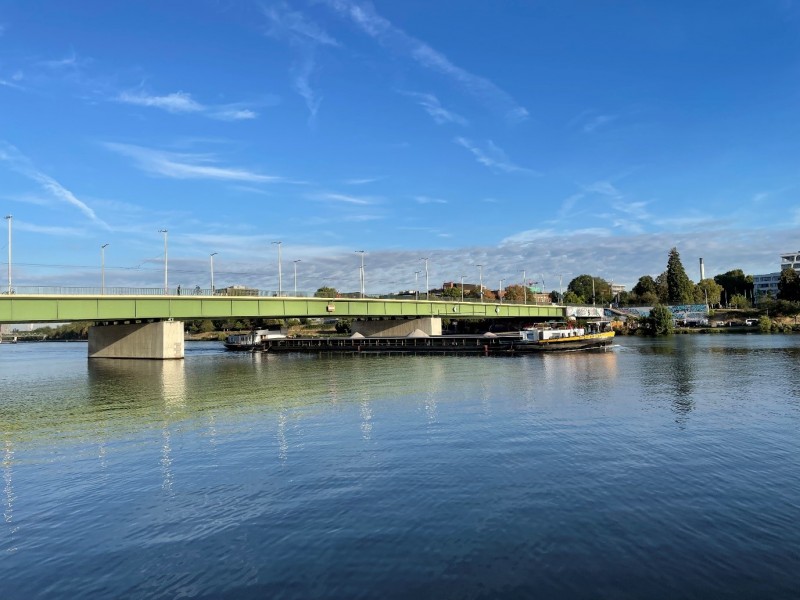Gas exchange workshop - Heidelberg 2022
Yuanxu Dong
University of East Anglia, Plymouth Marine Laboratory

Figure 1. The Skater bridge across the Neckar river and leading to the Heidelberg University.
Exciting to join the first international meeting in Germany after two years of the pandemic. In August 2022, I was invited by Prof. Bernd Jähne to give a talk at the Gas exchange workshop (Cross-linking lab and field measurements and numerical modelling to identify and quantify the mechanisms of air-sea gas transfer) held at Heidelberg University. This is the first time for me to join an academic meeting outside of UK during my PhD.
Heidelberg is a very beautiful and quiet city. I stayed in there for three days. I enjoyed jogging along the Neckar river in the morning. Heidelberg university is a world famous university. I walked in the campus before the workshop and was impressed by their buildings. The style of the building is like a square which gives me a feeling of steady, preciseness and rationality.
I was the only one working in the UK who joined the Heidelberg workshop because the UK marine society was celebrating the Challenger 150 conference at that time. I gave a ~30-min talk and listened to many interesting presentations. At the end of the first day, the host led us to visit their splendid annular wave tank. The Heidelberg group has one of the most historical wave tanks and now they developed a new wave tank named Aeolotron, which is much bigger than the old one.
I had many discussions with Bern Jähne and Kerstin Krall (Heidelberg University), Christa Marandino from the GEOMAR Institute, Alex Babanin from the University of Melbourne. The estimate of the gas exchange rate relies on the parameterization with wind speed, but the ocean waves/bubbles might play an important role in the air-sea gas transfer. The current lab. results, field measurements and theoretical work show discrepancies on the bubble-mediated gas transfer, which is a big gap to fill for the air-sea gas exchange community.
I am very grateful that I had this chance to contribute to this workshop and to meet so many excellent senior scientists with amazing research discussions. I got many ideas for my further study. More importantly, I established the collaboration with Bernd and Christa, which will benefit for my career.
Profile
BSc in Marine Science at the Ocean University of China, Qingdao, 2012-2016.
Dissertation title: Preliminary research on the gas transfer velocity across the sea surface
Master’s in Physical Oceanography at the Ocean University of China, Qingdao, 2016-2019.
Thesis title: Parameterization and measurements of the air-sea carbon dioxide flux using the eddy covariance method.
PhD in Environmental Sciences at the University of East Anglia, Norwich and Plymouth Marine Laboratory, Plymouth, 2019-.
Project title: Processes affecting the gas transfer velocity along latitudinal gradients and the impact on global CO2 air-sea flux estimates
Publications: https://scholar.google.com/citations?hl=en&user=X1tSc9IAAAAJ
Latest News
Royal Society Publishing Photography Competition 2025
Please see a message from the Royal Society below:
We are delighted to announce that the 2025 Competition is now open for entries until 15 August for a chance to win £1000! The competition celebrates the power of photography in conveying the wonder of science happening all around us and photographs can be submitted in the categories of: Astronomy, Behaviour, Earth Science and Climatology, Ecology and Environmental Science, and Microimaging.
The competition is free to enter and open to anyone studying or working in science at graduate level or above. Category winners will receive a one-year membership to the Royal Photographic Society and the overall winner will receive a grand prize of £1,000. Find out more: https://bit.ly/RSPphotocomp
October 2025 MEDIN Workshop: Marine Data Management, Governance and the MEDIN toolset
The Marine Environmental Data and Information Network (MEDIN) are pleased to announce that registration is now open for the next occurrence of our popular free online training workshop: ‘Marine Data Management, Governance and the MEDIN toolset’ on the 13th – 17th October 2025 on OceanTeacher Global Academy.
Marine Data Management, Governance and the MEDIN toolset
The Marine Environmental Data and Information Network (MEDIN) and OceanWise are delighted to invite you to attend our popular free online training workshop: ‘Marine Data Management, Governance and the MEDIN toolset’ on the 19th – 23rd of May 2025.
